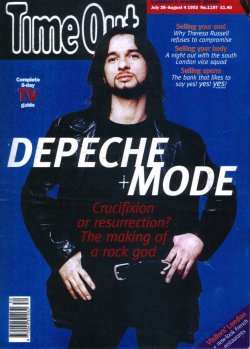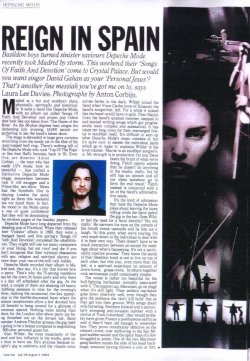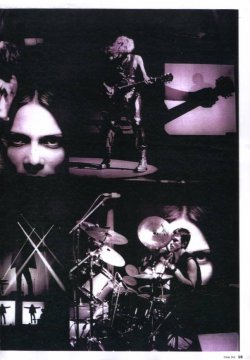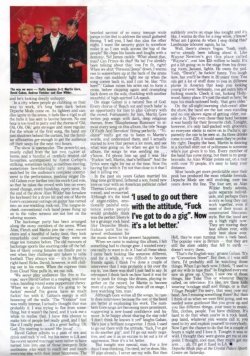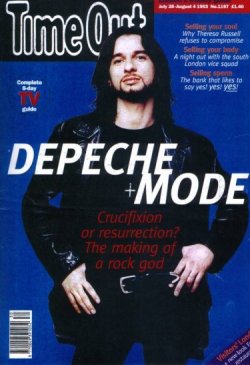You are using an out of date browser. It may not display this or other websites correctly.
You should upgrade or use an alternative browser.
You should upgrade or use an alternative browser.
Depeche Mode Reign In Spain (Time Out, 1993)
- Thread starter demoderus
- Start date
-
- Tags
- 1993 reign in spain time out
Enthusiastic, almost breathless at times, article set during and after the band's Madrid performance on the SOFAD tour. Dave does most of the speaking here, with a little help from Alan, with the result that the cracks in the band are self-evident. Notwithstanding, the author bends over backwards at times to paint everything as hunky-dory. A scintillating atmosphere, but whom does it fool? This one tries too hard.
" David Gahan admits to a past of sex and drink and rock’n’roll, but his move to L.A. and his recent second marriage seem rather to have turned him into one of those energetic little sunbeams who want to reach out and touch everyone else with their inner happiness. "
Many thanks to Stephen Singleton for kindly supplying colour copies of the article.
Basildon boys turned sinister saviours Depeche Mode recently took Madrid by storm. This weekend their “Songs Of Faith And Devotion” come to Crystal Palace. But would you want singer David Gahan as your “Personal Jesus”? That’s another fine messiah you’ve got me on to, says Laura Lee Davies. Photographs by Anton Corbijn.
Madrid is a hot and stubborn place, physically, spiritually and historically. It suits a band like Depeche Mode, with an album out called “Songs Of Faith And Devotion” and promo pop videos that look like out-takes from “The Name Of The Rose”. As the 30-plus degrees heat singes the darkening July evening, 16,000 people are gathering to see the band’s latest show.
The stage is shrouded in huge grey curtains stretching from the sandy pit to the tiles of the open-topped bull ring. There’s nothing left of the Depeche Mode who took “Top Of The Pops” on like four fluffy bunnies, back in ’81. Even live, art director Anton Corbijn – the man who has made U2’s music look so beautiful – has crafted a distinctive Depeche Mode image, somewhere between rock’n’roll swagger and a Prince-like sex-show. News that the Symbolic One is playing London the same night as them this weekend has not fazed them. In fact, the mood in the Mode camp is one of quiet confidence that they will be dominating the reviews pages of the Sunday papers.
Depeche Mode have long departed from the bleeping pop of Pixieland. When they released their “Violator” album in 1990, they were a changed band, and this spring’s “Songs Of Faith And Devotion” completed the rehabilitation. They might still use too many computers for your liking, but eat vinyl and die if you don’t recognise that their mystical obsessions with sex, religion and spiritual slavery are more than your run-of-the-mill rock fodder.
Depeche Mode recorded their album in Madrid and, they say, it’s a city that knows how to party. That’s why the 75-strong roadshow has hit the town 24 hours early and why there is a day off scheduled after the gig. At the hotel, a couple of them are shaking off heavy clubbing sessions in time for the evening’s show, making the occasional, low-key appearance in the marble-decorated foyer where the patient receptionists allow a few devoted fans (all female) to hang around for a glimpse of someone special. Nothing more taxing than plans for the London after-show party are being thrashed out on the terrace bar. Band member Andrew Fletcher groans, the gig itself is going to be a breeze compared to negotiating a 500-plus guest list.
Alan Wilder, the most musicianly of the band and key influence in the studio, gets up in time to have tea. He’s anxious because tonight’s gig is outdoors, and the visuals come across better in the dark. Wilder joined the band when Vince Clarke (now of Erasure), the band’s songwriter, left. For a while it looked like the band would have to split. Then Martin Gore, the band’s quietest member, stepped in and started writing songs which got progressively more complex and substantial. It has taken ten long years for their rearranged line-up to establish itself. “It’s difficult to sum up what Depeche Mode’s music consists of, but it’s quite easy to assess the individual parts which go to make it,” explains Wilder in his level manner. “Martin is an excellent songwriter. My strength is in production. On tour Dave bears the brunt of what we’re doing. Fletch openly admits that he doesn’t do anything in the studio, really, but he still has an opinion and all our ideas somehow go to form the end result.” Fletch instead is concerned with a lot of the band’s administrative needs.
It’s the kind of admission that fuels the Depeche Mode jokes about leaving the tapes rolling while the band spend the gig in the bar. Does Wilder feel the need for a band identity? “No, not really.” He narrows his eyes as the corners of his mouth tweak upwards and he lets out a laugh. “At this point, when we’re touring, it’s very much down to the individual to deal with it in their own way. There doesn’t have to be much interaction between us except for meetings about what’s happening. It’s not a particularly creative process.” They know the secret of their Basildon bond is not to live on top of each other, but this tour, even more than the last, is a spiritual experience no amount of down-home, grass-roots, brothers-together rock seriousness could consciously muster. [1]
[1] - This sentence surely deserves a prize for extreme irony, or at least airbrushing the nasty facts at all costs. If Depeche Mode knew better than to live in each others' pockets at this point, it was because they had tried it during the recording of Songs Of Faith And Devotion by living together in a villa and had almost destroyed themselves as a consequence. If the sort of camaraderie the author describes wasn't the cause of the "spiritual experience" of the tour, it's because the "spiritual experience" was rather more of the unpleasant kind for all concerned, and the camaraderie virtually non-existent.
Last edited:
The venue is rather too beautiful for the bull-fighting barbarism normally associated with it. The support act, Marxman, go on stage when it’s still light. Their politico rap-dance goes down relatively well, even though they give the audience the “don’t kill bulls” line as they get into their groove. With songs about wife-battering, Northern Ireland and a particularly stomping anti-invasion number with a chorus of “Fuck Columbus!”, they would probably have given Franco a posthumous earful as well if they’d been old enough to remember him. They prove remarkably effective on the relaxed crowd, now mellowing in the San Miguel-sodden sunset and the spicy haze of a few smuggled-in joints. One of the two Marxman gang-leaders nurses the side of his head backstage, someone having thrown a coin at him, and he’s looking deeply unhappy.
In a city where people go clubbing on their way to work, it’s long been dark before Depeche Mode come on. As lighters and candles ignite in the arena, it feels like a vigil to all the bulls it has sent to bovine heaven. No one here is too tired to party and the chorus of “Olé, Olé, Olé, Olé,” gets stronger and more regular. For the whole of the first song, the band are just shadows behind the curtain, but the familiar silhouettes are enough to get the audience off their seats for the next two hours.
The show is spectacular. The powerful set, mostly culled from the last two, rockier albums, and a handful of carefully treated old favourites, accompanied by Anton Corbijn’s striking, sometimes tacky, sometimes moving, sometimes bewilderingly arty images, is matched by the audience’s complete commitment to the performance, pushing singer David Gahan ever further into his mock-God role, so that he takes the crowd with him on every mood change, every handclap, every strut. By the end of the show Alan Wilder has forsaken his keyboard for a drum kit and one of Martin Gore’s occasionally outings on guitar has turned into an axe-wielding rock-out. The tongue-in-cheek conventional rock band poses flung up on to the video screens are not lost on the adoring masses.
The backstage party has been arranged along the stony corridors of the arena. When Alan, Fletch and Martin join the crew, record execs and a handful of lucky fans, they look remarkably cool considering they were on stage ten minutes before. The old rumours of backstage sports like snorting coke off the bellies of likely young females are finally put to rest when they challenge any takers to table football. They always win – it’s in Martin’s right-hand flicks. David, however, is still chilling out in his room. When the express train from Cloud Nine pulls in, we can talk.
“We never play audiences like this in Europe,” says David Gahan in a rasping, mid-tour voice, handing round some peppermint chewy. “When we go to America it’s going to be fuckin’ mental! I’m gonna have so much fuckin’ fun with it.” Gahan’s energy is still bouncing off the walls. “The ‘Violator’ tour was really intense, I actually thought that was probably it. I was trying to flee from something, but it wasn’t the band, and it took me a while to realise that. I have this chance to make lots of people feel really good, and I feel like if I really push… it’s a great feeling. [2] Oh God, I’m starting to sound like Jesus!”
David Gahan admits to a past of sex and drink and rock’n’roll, but his move to L.A. and his recent second marriage seem rather to have turned him into one of those energetic little sunbeams who want to reach out and touch everyone else with their inner happiness. The bearded saviour of so many teenage souls jumps to his feet to address the small gathered throng. “I tell you, I had this idea the other night, I want the security guys to make it so I can walk across the top of the people!” He claps his hands and laughs with a demonic, Sid James cackle. “What about that, man? Can Prince do that? Ha ha! I’ve already been talking about this: ’cos I’m fit, right? When we shut “Personal Jesus” down, I wanna run to somewhere up at the back of the arena so they can suddenly light me up when the song comes back in, and I can be, like: ‘I’m here!’.” Gahan raises his arms out to form a cross, before clapping again and crumpling back down on the sofa, chuckling with another mouthful of high-spirited L.A.-speak.
On stage Gahan is a natural Son of God. Every chorus of “Reach out and touch babe” [sic] is an opportunity for him to play Calvary with the crowd. Fortunately for him, Martin Gore writes pop songs with dark, deep religious themes, from “Blasphemous Rumours” to almost every song on this album, the title “Songs Of Faith And Devotion” fitting perfectly. “ ‘Violator’ really got me to listen to Martin’s words, and understand them, and I actually started to love that person a lot more, and see what was going on. So when we got to this album, the songs he was sending me… y’know, I’d phone him up and I was like ‘Fuckin’ hell, Martin, that’s brilliant!’ And the lyrics were right for me at the time. Now I’m having fun with it. I’m not that close to it that I feel it killing me.”
In a city where people go clubbing on their way to work, it’s long been dark before Depeche Mode come on. As lighters and candles ignite in the arena, it feels like a vigil to all the bulls it has sent to bovine heaven. No one here is too tired to party and the chorus of “Olé, Olé, Olé, Olé,” gets stronger and more regular. For the whole of the first song, the band are just shadows behind the curtain, but the familiar silhouettes are enough to get the audience off their seats for the next two hours.
The show is spectacular. The powerful set, mostly culled from the last two, rockier albums, and a handful of carefully treated old favourites, accompanied by Anton Corbijn’s striking, sometimes tacky, sometimes moving, sometimes bewilderingly arty images, is matched by the audience’s complete commitment to the performance, pushing singer David Gahan ever further into his mock-God role, so that he takes the crowd with him on every mood change, every handclap, every strut. By the end of the show Alan Wilder has forsaken his keyboard for a drum kit and one of Martin Gore’s occasionally outings on guitar has turned into an axe-wielding rock-out. The tongue-in-cheek conventional rock band poses flung up on to the video screens are not lost on the adoring masses.
The backstage party has been arranged along the stony corridors of the arena. When Alan, Fletch and Martin join the crew, record execs and a handful of lucky fans, they look remarkably cool considering they were on stage ten minutes before. The old rumours of backstage sports like snorting coke off the bellies of likely young females are finally put to rest when they challenge any takers to table football. They always win – it’s in Martin’s right-hand flicks. David, however, is still chilling out in his room. When the express train from Cloud Nine pulls in, we can talk.
“We never play audiences like this in Europe,” says David Gahan in a rasping, mid-tour voice, handing round some peppermint chewy. “When we go to America it’s going to be fuckin’ mental! I’m gonna have so much fuckin’ fun with it.” Gahan’s energy is still bouncing off the walls. “The ‘Violator’ tour was really intense, I actually thought that was probably it. I was trying to flee from something, but it wasn’t the band, and it took me a while to realise that. I have this chance to make lots of people feel really good, and I feel like if I really push… it’s a great feeling. [2] Oh God, I’m starting to sound like Jesus!”
David Gahan admits to a past of sex and drink and rock’n’roll, but his move to L.A. and his recent second marriage seem rather to have turned him into one of those energetic little sunbeams who want to reach out and touch everyone else with their inner happiness. The bearded saviour of so many teenage souls jumps to his feet to address the small gathered throng. “I tell you, I had this idea the other night, I want the security guys to make it so I can walk across the top of the people!” He claps his hands and laughs with a demonic, Sid James cackle. “What about that, man? Can Prince do that? Ha ha! I’ve already been talking about this: ’cos I’m fit, right? When we shut “Personal Jesus” down, I wanna run to somewhere up at the back of the arena so they can suddenly light me up when the song comes back in, and I can be, like: ‘I’m here!’.” Gahan raises his arms out to form a cross, before clapping again and crumpling back down on the sofa, chuckling with another mouthful of high-spirited L.A.-speak.
On stage Gahan is a natural Son of God. Every chorus of “Reach out and touch babe” [sic] is an opportunity for him to play Calvary with the crowd. Fortunately for him, Martin Gore writes pop songs with dark, deep religious themes, from “Blasphemous Rumours” to almost every song on this album, the title “Songs Of Faith And Devotion” fitting perfectly. “ ‘Violator’ really got me to listen to Martin’s words, and understand them, and I actually started to love that person a lot more, and see what was going on. So when we got to this album, the songs he was sending me… y’know, I’d phone him up and I was like ‘Fuckin’ hell, Martin, that’s brilliant!’ And the lyrics were right for me at the time. Now I’m having fun with it. I’m not that close to it that I feel it killing me.”
[2] - In 1997, while talking on K-ROQ radio about the experience of performing live, Dave shed a little light on his driven state of mind at the time: "I don't know why I've been given this gift, to be able to experience that, I really don't. [...] What was happening was, I played the rock star, I played the rock star with all the cliches and all the trappings, because I thought that's what I was supposed to do if I really meant it."
Last edited:
In the past six years Gahan married his long-time girlfriend, fathered a son, found new love on tour with an American publicist called Theresa Conroy, got divorced, and re-married. Although it’s the kind of angst-ridden, emotionally painful existence some people would probably think was the perfect lifestyle for a grumpy rock band like Depeche Mode. Gahan puts his renewed enthusiasm for the music down to his present happiness.
“When we came to making this album, I felt something had to change gear. I wanted everyone to really want to do it. I had all these ideas. I came back looking like someone different, and for a while, it was difficult to become friends again. I think I’ve done a couple of interviews that I was probably a bit over the top in, ’cos there was stuff I just had to say. In retrospect I think back on how hard it was for me to push for things like drums, playing together on the record, for Martin to become more of a star. Seeing him show off on stage, I love watching him, man.”
Although Gore writes all the songs, he rarely does interviews because the rest of the band are better at explaining his work. The numbers Gore sings are becoming more prominent, suggesting a new-found confidence and humour. Is he happy about sharing the star role? “I don’t think he knows it yet!” laughs Gahan. “He’s just a brilliant songwriter. I think I used to go out there with the attitude, ‘fuck. I’ve got to do another gig’, and I’d go out really negative, and use it as an excuse to let out a lot of aggression. Now it’s a lot better.
“But tonight was special, man. For a few days I was thinking, I’m tired, we’ve done, like, 35 gigs already, I never see my wife. But then suddenly you’re on stage and it’s like, I wanna do this for a long while, y’know? What am I gonna do when I stop doing this? Landscape labourer again, ha ha.”
Well, there’s always Vegas. “Yeah, yeah, we’ve already been talking about it. Like Wayne Newton’s got this place called ‘Wayne’s’, cost him $25 million to build. It’s got a lift going on to the stage from his dressing room, Jacuzzi, lights. He owns the pad. Yeah, ‘Dave’s’, be fuckin’ funny. You laugh now, but you’ll be there in 20 years’ time. You can get a lot of stuff done to you in different places in America that keep you looking young for ever. Seriously, you get extra bits of fucking muscle. Check it out, fucking Hollywood, funny place. It’s just the stuff in here,” he taps his much-tattooed body, “that gets older.”
On the all-night / morning club-crawl after the show, the band are the last ones standing and no one shows signs of getting older, outside or in. They even chose their hotel because it was handy for their favourite club. Tonight, however, it’s only half-packed with groovers, so everyone elects to move on to Pacha’s, apparently the one to be seen at. As three drinks come to over £20, it would seem they’re probably right. Despite the heat, Martin is dancing in a football shirt out of politeness to some who’s just given it to him. Every member of the band has come along, but there is no gang-bravado. As Alan Wilder points out, on a tour with over 70 people, it’s easy to keep your distance.
Most bands get more predictable once their peak has produced the most reliable formula. Depeche Mode are still evolving, over ten years down the line. The four are, as Alan Wilder freely admits, quite separate individuals, and perhaps there is only so long they can work together, even if most of their music is constructed Meccano-style. But the band are on a high right now. They are touring their best album ever, with their best show ever. Hell, they’re even turning into a rock band. The popular view in Britain – that they are still the alien oddity that fell to earth – doesn’t worry them. [1]
“That’s the English way,” groans Gahan. “It’s so ‘Coronation Street’. But then, if I was still there, I’d probably still be watching those things. When I go back now, I think, “I used to get my wife to tape this!” In England everyone saw us grow up. C’mon, I saw one of those things, like Take This or whatever they’re called on television. It’s like, are these kids wearing bondage stuff and things, or is that Village People? I’m sorry, that went over my head. Am I missing something there? But then I think of us when we were first going, and we needed some guidance! But you grow up and you like different things, your taste in music, film, clothes, people. You have children. It’s hard to do that when you’re in a rock band, pop band, whatever you wanna call it; you need to try and explain yourself to everybody. Now I get the chance to do that for a couple of hours a night and I love it. Tonight it was so wild, I thought they were gonna get me at one point. I thought, cool man, they might get my arm… ah, I’ll get it fixed in L.A.”
Depeche Mode play at the Crystal Palace Sports Centre on Saturday.
“When we came to making this album, I felt something had to change gear. I wanted everyone to really want to do it. I had all these ideas. I came back looking like someone different, and for a while, it was difficult to become friends again. I think I’ve done a couple of interviews that I was probably a bit over the top in, ’cos there was stuff I just had to say. In retrospect I think back on how hard it was for me to push for things like drums, playing together on the record, for Martin to become more of a star. Seeing him show off on stage, I love watching him, man.”
Although Gore writes all the songs, he rarely does interviews because the rest of the band are better at explaining his work. The numbers Gore sings are becoming more prominent, suggesting a new-found confidence and humour. Is he happy about sharing the star role? “I don’t think he knows it yet!” laughs Gahan. “He’s just a brilliant songwriter. I think I used to go out there with the attitude, ‘fuck. I’ve got to do another gig’, and I’d go out really negative, and use it as an excuse to let out a lot of aggression. Now it’s a lot better.
“But tonight was special, man. For a few days I was thinking, I’m tired, we’ve done, like, 35 gigs already, I never see my wife. But then suddenly you’re on stage and it’s like, I wanna do this for a long while, y’know? What am I gonna do when I stop doing this? Landscape labourer again, ha ha.”
Well, there’s always Vegas. “Yeah, yeah, we’ve already been talking about it. Like Wayne Newton’s got this place called ‘Wayne’s’, cost him $25 million to build. It’s got a lift going on to the stage from his dressing room, Jacuzzi, lights. He owns the pad. Yeah, ‘Dave’s’, be fuckin’ funny. You laugh now, but you’ll be there in 20 years’ time. You can get a lot of stuff done to you in different places in America that keep you looking young for ever. Seriously, you get extra bits of fucking muscle. Check it out, fucking Hollywood, funny place. It’s just the stuff in here,” he taps his much-tattooed body, “that gets older.”
On the all-night / morning club-crawl after the show, the band are the last ones standing and no one shows signs of getting older, outside or in. They even chose their hotel because it was handy for their favourite club. Tonight, however, it’s only half-packed with groovers, so everyone elects to move on to Pacha’s, apparently the one to be seen at. As three drinks come to over £20, it would seem they’re probably right. Despite the heat, Martin is dancing in a football shirt out of politeness to some who’s just given it to him. Every member of the band has come along, but there is no gang-bravado. As Alan Wilder points out, on a tour with over 70 people, it’s easy to keep your distance.
Most bands get more predictable once their peak has produced the most reliable formula. Depeche Mode are still evolving, over ten years down the line. The four are, as Alan Wilder freely admits, quite separate individuals, and perhaps there is only so long they can work together, even if most of their music is constructed Meccano-style. But the band are on a high right now. They are touring their best album ever, with their best show ever. Hell, they’re even turning into a rock band. The popular view in Britain – that they are still the alien oddity that fell to earth – doesn’t worry them. [1]
“That’s the English way,” groans Gahan. “It’s so ‘Coronation Street’. But then, if I was still there, I’d probably still be watching those things. When I go back now, I think, “I used to get my wife to tape this!” In England everyone saw us grow up. C’mon, I saw one of those things, like Take This or whatever they’re called on television. It’s like, are these kids wearing bondage stuff and things, or is that Village People? I’m sorry, that went over my head. Am I missing something there? But then I think of us when we were first going, and we needed some guidance! But you grow up and you like different things, your taste in music, film, clothes, people. You have children. It’s hard to do that when you’re in a rock band, pop band, whatever you wanna call it; you need to try and explain yourself to everybody. Now I get the chance to do that for a couple of hours a night and I love it. Tonight it was so wild, I thought they were gonna get me at one point. I thought, cool man, they might get my arm… ah, I’ll get it fixed in L.A.”
Depeche Mode play at the Crystal Palace Sports Centre on Saturday.
[1] - Credit where credit's due, in hindsight this is a very perceptive paragraph. By way of an afterword, I did wonder at first if the sense of spin that pervades the article was ineptitude or intentional cover-up on the author's part, or the result of being leant on by a shady PR juggernaut such as all big acts have (yes, even Mode). Then I came across a damning excerpt from NME, 25th September 1993, clearly written about this article, which throws the whole thing into perspective:
" The press officer asks me what I think of the feature. The piece plays to the Depeche myth, David as a Rock God, ranting about the gig he’s just played being extra special, everything is hunky dory.
" It feeds the fans what they want to hear, I guess it serves the magazine’s purposes, I tell them, though I feel that it’s not the real Depeche story, that it’s a con job.
" “It serves its purpose for us, too,” decides the press officer.

